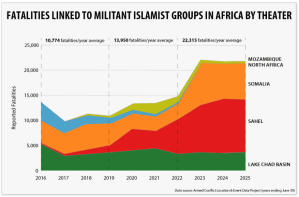A study by the Centre for Strategic Studies (ACSS) found that extremist Muslim groups have expanded their presence in Africa, increasing the number of deaths associated with violent activities in certain parts of the continent. In the year ending June 30, 10 militant Muslim groups were responsible for the deaths of 22,307, most of whom are Christians from the West, East and Central Africa.
Analysis by the Centre shows that the group has stepped up violent and deadly measures since 2023, representing a 60% increase from 2020 to 2022. “Nearly half of the deaths (10,685) over the past year have been in the Sahel,” said the vast region covering 10 countries, including Mali, Chad, Nigeria, Burkina Faso and Cameroon.
“Along with the Lake Chad Basin, these three regions (including Somalia) have accounted for 99% of the deaths of militants related to Islam in Africa over the past year,” the study mapped how extremist groups have expanded their territorial ownership on the continent. “Across Africa, an estimated 950,000 square kilometers (367,000 square miles) of population territory is out of government control due to radical Muslim rebellions, which corresponds to the size of Tanzania.”
Over the past decade, the study said that extremist Islamist groups have been responsible for more than 150,000 deaths. Somali al-Shabaab and Sahel Junim (Jamaat Nusrat ul Islam wa al-Muslimin) have stepped up their activities from 2022 to 2022, leading to more than 49,000 deaths in each of the two regions of the last Decade. The Lake Chad Basin countries suffer an estimated 39,000 deaths over this time frame.
Political instability in the Sahel region has been a major contributor to the surge in deaths associated with extremist groups. The region has averaged 10,500 deaths over the past three years, compared to 4,900 in the previous period between 2020 and 2023.
“The pace and magnitude of the violence in the Sahel could be even higher than reported given the military junta that seized power in Mali, Burkina Faso and Niger restricted media access within the region.

With up to 7,000 extremists, the JNIM network is responsible for more than 80% of the deaths in the Sahel, particularly the North, Central, South Mali and South Burkina Faso. The JNIM network currently accounts for more than half of Burkina Faso. The group has recently increased its use of social media, drones and AI, recruited fighter jets from Nigeria, Mali and Burkina Faso, expanded propaganda and opposed the military.
In Mali, Jnim shares a video of alleged abuse by security forces targeting the Fulani community, with the aim of portraying him as “as an advocate for a marginalized group.” Government forces accused militants of supporting extremists in a study linking 17,700 civilian deaths to government and allied forces.
The increase in attacks by Somalia resident Al-Shabaab resulted in 6,224 deaths in 2024/2025. The group’s financial muscles are drawn from fear tor, road tolls and copyright infringement, estimated at $200 million, comparable to Somalia’s domestic revenues, making it easier for the group to recruit fighters currently estimated at between 7,000 and 12,000. The concern is the growth of the Islamic State in Somalia (ISS), reporting that the UN is now the administrative and financial headquarters of ISIS Global.
This study is in an attack on Christians in a church in the city of Comanda on the eastern territory by the Allied Democrats, an extremist group affiliated with ISIL/ISIS. The extremist group took responsibility for the 43 worshipers killed at night mass, burning burning shops and homes. The group also argued responsibility for the attack in early July that claimed 66 lives in Ituri province, near the Uganda border.
